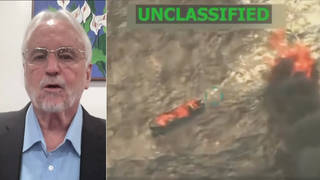
Topics
Guests
- Jason Boxprofessor and ice climatologist at the Geological Survey of Denmark and Greenland.
Links
The massive heat dome that shattered all-time temperature records across much of Europe last week has settled in over Greenland, driving temperatures across the vast region to as much as 30 degrees Fahrenheit above normal. In July, Greenland’s ice sheet lost 197 billion tons of ice, the equivalent of around 80 million Olympic swimming pools. This comes as the World Meteorological Organization said Thursday that July was the warmest month in recorded human history. It followed the hottest June on record, as atmospheric carbon dioxide levels climbed to a record high of 415 parts per million earlier this year. We speak with Jason Box, professor and ice climatologist at the Geological Survey of Denmark and Greenland.
Transcript
AMY GOODMAN: This is Democracy Now! I’m Amy Goodman. We’re going to turn right now to the issue of Greenland. The World Meteorological Organization said Thursday that July was the warmest month in recorded human history. It followed the hottest June on record, as atmospheric carbon dioxide levels climbed to a record high of 415 parts per million earlier this year. The massive heat dome that shattered all-time temperature records across much of Europe last week has settled in over Greenland, driving temperatures across the vast region to as much as 30 degrees Fahrenheit above normal. In July, Greenland’s ice sheet lost 197 billion tons of ice, the equivalent of around 80 million Olympic swimming pools.
Writing in Rolling Stone in an article titled “Greenland Is Melting Away Before Our Eyes,” the meteorologist Eric Holthaus warns Greenland’s ice was expected to melt at its fastest-ever rate ever recorded, on Thursday, when, quote, “more than 12 billion tons of water will permanently melt away from the ice sheet and find its way down to the ocean, irreversibly raising sea levels globally.”
For more, we’re going to Copenhagen, Denmark, where we’re joined by Jason Box, professor and ice climatologist at the Geological Survey of Denmark and Greenland.
Jason Box, welcome to Democracy Now! In these last minutes we have together, can you just lay out what is happening in Greenland, what it has to do with the climate crisis and the heat wave that we’ve been experiencing around the world?
JASON BOX: You mentioned this heat dome, this hot air that is parked over Greenland. That same air mass started in the Sahara. Warm air drifted on to Europe. It set records there across Europe, as I’m sure you’ve heard about. That warm air mass then drifted north, setting records across Scandinavia. It then, in a bizarre kind of circulation, drifted to the west. Normally the flow is the opposite direction. So this warm blob of air drifts over the ice sheet. And actually, Greenland was already well above average temperatures. Melt onset started three to five weeks ahead of normal, in early May. We saw this big melt year coming, and then this recent drift of warm air over the ice sheet is just a conspicuous example of how ice and climate change in the Arctic has been steadily warming.
We see an acceleration of loss from Arctic Canada, from Alaska, from Greenland — the ice. It has a lot of downstream effects. It’s flooding the North Atlantic with freshwater, disrupting ocean circulation in ways we don’t fully appreciate, probably increasing storm activity for northwestern Europe. And it’s part of our climate system, which is kind of getting unhinged as carbon continues to accumulate in the atmosphere. The ocean effect is a delayed response to the enhanced greenhouse effect. And we’re really just starting to see, as the climate system punches out of the noise of the last century, a very clear, steep-rising temperature in the Arctic, that’s actually affecting weather patterns around the hemisphere.
AMY GOODMAN: What is happening right now, the extreme temperatures that are engulfing Greenland, what will this mean for the rest of the planet? And can you talk about the issue of climate refugees, the symptoms of the climate crisis, from food shortages to thousands and thousands of people fleeing from regions affected by drought and water shortage, such as, well, throughout the world?
JASON BOX: The key factor for Greenland’s and other land ice loss is sea level rise. Now, that will take decades to really be felt in earnest. Between now and when we really have large sea level rise, it’s during high tide, storm surge, thermal expansion —events like Superstorm Sandy, that flooded the New York subway, that you get when you combine sea level rise with thermal expansion and high tide and storm surge.
But more immediate — and I’m glad that you mentioned that — is that, actually, the continents are heating up about twice as fast as the global temperature, just like the Arctic is heating twice as fast as the global temperature. The continents are drying. This is undermining food security. We are seeing more drought. And that will be a more immediate consequence of enhanced greenhouse effect. The migration of people that lose their food and water security, and that effect being disruptive for political systems, as these people seek a better livelihood, reluctantly leaving their homes and going elsewhere, I’m convinced that that will be a more immediate consequence of elevated greenhouse effect.
Sea level rise is an urgent, huge issue, which ultimately will force really uncountable people, numbers of people, to forfeit their land in coastal areas that we cannot justify or afford to build sea defenses. And those displaced people will add on top of food refugees and drought refugees, which we’re already seeing today.
AMY GOODMAN: We want to thank you so much for being with us. I’m Amy Goodman. Jason Box is our guest, professor and ice climatologist at the Geological Survey of Denmark and Greenland. We’ll do Part 2 and post it online. Thanks so much.










Media Options